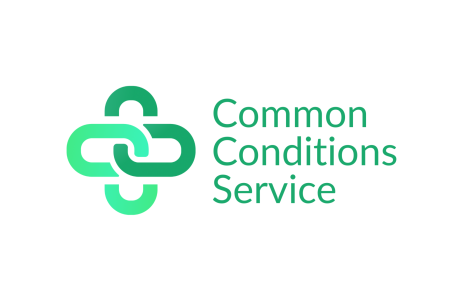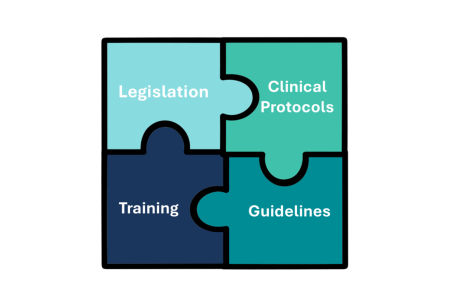Common Conditions Service
The Common Conditions Service enables community pharmacists to provide advice and offer expanded treatment options to patients for eight common conditions.
Page updated 19 January 2026

The Common Conditions Service enables community pharmacists to provide advice and offer expanded treatment options to patients for eight common conditions.
While pharmacists already provide advice, over-the-counter treatment and/or referral for these conditions, this new service expands community pharmacists’ ability to manage and treat patients with these common conditions by enabling them to prescribe certain prescription-only medicines, where appropriate, in line with HSE clinical protocols.
The Common Conditions Service has been developed in response to one of the recommendations of the Expert Taskforce to support the expansion of the role of pharmacy. The Taskforce considered how pharmacists could expand upon their present scope of practice for the benefit of patients, the public and the wider healthcare system.
The eight common conditions are:
- Allergic Rhinitis
- Cold Sores
- Conjunctivitis
- Impetigo
- Oral Thrush
- Shingles
- Uncomplicated Urinary Tract Infections (UTIs)
- Vulvovaginal Thrush
Regulatory framework to enable the Common Conditions Service
There are four key enablers within the regulatory framework that authorise community pharmacists to provide the Common Conditions Service:
- Legislative amendments to enable the Common Conditions Service
- HSE Clinical Protocols for each condition approved by the Minister for Health
- PSI Guidelines to support the Common Conditions Service
- Pharmacist Training for the Common Conditions Service provided by the IIOP

You can learn more about the four enablers below.
1. Legislative amendments to enable the Common Conditions Service
In October 2025, the following legislative amendments to enable the Common Conditions Service were signed by the Minister for Health:
- Regulation of Retail Pharmacy Businesses (Amendment) Regulations 2025 (S.I. No. 503/2025)
- Medicinal Products (Prescription and Control of Supply) (Amendment) (No. 3) Regulations 2025 (S.I. No. 502/2025)
- Medicinal Products (Prescription and Control of Supply) (Amendment) (No.4) Regulations 2025 (S.I. No. 625/2025)
- Medicinal Products (Control of Placing on the Market) (Amendment) Regulations 2025 (S.I. No. 504/2025)
In addition, with the consent of the Minister for Health, the PSI Council has published Rules to enable the education and training for the service:
- Pharmaceutical Society of Ireland (Education and Training required to prescribe medicinal products in accordance with a Common Conditions Service) Rules 2025 (S.I. No. 507/2025)
2. HSE clinical protocols approved by the Minister for Health
When delivering the Common Conditions Service, pharmacists must adhere to the eight clinical protocols that have been developed by the HSE and approved by the Minister for Health. The clinical protocols are available on the HSE website.
The clinical protocols guide pharmacists in delivering clinical care and set out appropriate clinical inclusion and exclusion criteria, formulary and referral pathways. They contain the medicines that should be recommended for each condition, including the appropriate prescription-only medicines that pharmacists are authorised to prescribe for each condition.
The Chief Medical Officer in the Department of Health and the HSE Chief Clinical Officer established a multi-disciplinary clinical sub-group to develop the clinical protocols, to ensure that they are based on the most up to date evidence and in line with national guidelines. The clinical sub-group comprised of clinicians with expertise in relevant clinical areas, and pharmacists with expertise in medication safety, antimicrobial stewardship and community pharmacy.
3. PSI Guidelines to support the Common Conditions Service
The PSI has published Guidelines to support the Common Conditions Service and facilitate compliance with the legislative framework. These guidelines outline a principles-based framework to support pharmacists in providing a safe, patient-centred Common Conditions Service. Before providing the service, pharmacists, and those in governance roles in pharmacies, must be familiar with and follow the guidelines developed by the PSI for the service.
The guidelines have been issued under Regulation 14 of the Regulation of Retail Pharmacy Businesses Regulations 2008 (S.I. 488 of 2008) as amended and approved by the Minister for Health.
The PSI invited feedback on the draft PSI education and training statutory rules and the draft guidelines to enable the Common Conditions Service in July and August 2025 during a public consultation. The consultation report is available.
4. Pharmacist training for the Common Conditions Service
Pharmacists who wish to provide the Common Conditions Service must complete the mandatory training as specified by the PSI. This training has been developed by a multidiscplinary team at RCSI in conjunction with the Irish Institute of Pharmacy (IIOP). The training is available on the IIOP website.
The mandatory training consists of the following self-directed online CPD modules:
Core Regulatory Module
The core module provides information about:
- the legal and ethical framework underpinning the service,
- how to access the clinical protocols, relevant legislation and guidelines,
- responsibility and accountability of those providing and delivering the service,
- the patient journey, including the need for communication and consultation with the patient,
- principles of Antimicrobial Stewardship,
- the HSE National Consent Policy and Safeguarding.
Common Condition Specific Module (for each condition)
Pharmacists must also complete a module on each of the eight common conditions that cover:
- clinical symptom identification and recognition of the condition,
- differential diagnosis,
- points of referral and escalation, and
- treatment options including additional pharmacological, nonpharmacological, self-care options and safety netting for each common condition.
The education and training approach for pharmacists to prescribe for the service was approved by the Community Pharmacy Expansion Implementation Oversight Group (IOG) and informed by international comparator research conducted by the PSI, as well as clinical advice from the IOG multi-disciplinary clinical sub-group established by the Chief Medical Officer and HSE Chief Clinical Officer.
Other supports for pharmacists and pharmacies
The IIOP webinar on 6 November 2025 provided an introduction and overview of the Common Conditions Service with presentations from the Department of Health, HSE, PSI and the IIOP. This webinar recording is useful to further understand the background, legislative framework and range of considerations that have gone into preparation for the service by the Community Pharmacy Expansion Implementation Oversight Group.
Additional resources have been developed by the Community Pharmacy Expansion Implementation Oversight Group to address the operational aspects of the service. The operational guidance and a set of frequently asked questions are available on the HSE website.
A Government of Ireland public awareness campaign for the Common Conditions Service will run in January and February 2026. Information for the public on the new service is available on the Department of Health website and on the HSE website, including the Pharmacy Finder that can be used to locate pharmacies participating in the Common Conditions Service. The public section of our website also has key messages about the service, including FAQs that may be useful to patients.
As more information about the Common Conditions Service becomes available, we will continue to provide updates on this website and by email to those registered with the PSI.

A number of changes to pharmacy practice are being introduced to expand the range of pharmacy services available to patients and the public in Ireland.

